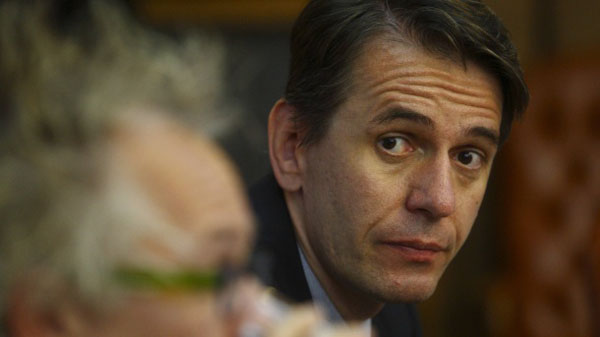
Sasa Radulović, photo: Marko Rupena/Beta
Another attempt at reforms in Serbia has failed. Resignation of Minister Radulovic, regardless of what form it will take in the end, is the last act of that drama, whose conclusion was long seen coming.
The campaign against now already former minister of economy deserves to be further explored, analyzed and explained. Para-state unions were only formally at its head; logistics were provided by the highest authorities of the Government of Serbia.
Mladjan Dinkic went the furthest – and fell the lowest – in that fight against common sense. He was once a leader of very reform-minded group of intellectuals and today his party is the last resort of populists and demagogues.
But Sasa Radulic is not the biggest loser in this sad story with an even sadder end. Nor is his demise a defeat of – as shown by researches, not so small number of – people who supported the changes. Radulovic’s demise is actually a defeat of the most powerful man in Serbia, the absolute winner in all categories. On the one hand, because it shows how powerless he actually is against some social groups and their dark forces. On the other hand, perhaps even more importantly, because it shows that he hasn’t resolved the issue in his own mind: what kind of Serbia he wants to build and how. And he let go of the man who – maybe not the only one, but certainly the most persistent and the loudest – attempted to make the Government do the things it itself promised Serbian citizens after the reconstruction and “freshening up”.
However, according to one interpretation in favor of Vucic, this is only a tactical move, because you can’t make promises of reforms and perform “painful reform cuts” before the elections. According to another interpretation, Vucic himself doesn’t believe in the need for fundamental and systemic reforms, but (like Dinkic) trusts that Arabian capital will make all his hassle worthwhile, so these elections were necessary, among other things, to get rid of the “annoying” Radulovic and his disturbing reformist proposals.
Fortunately, we won’t have to wait long to see which one of these two “schools of thought” was right.
Translated by Marijana Simic
Peščanik.net, 03.02.2014.
The following two tabs change content below.

Mijat Lakićević, rođen 1953. u Zaječaru, završio Pravni fakultet u Beogradu 1975, od 1977. novinar Ekonomske politike (EP). 90-ih saradnik mesečnika Demokratija danas (ur. Zoran Gavrilović). Kada je sredinom 90-ih poništena privatizacija EP, sa delom redakcije stupa u štrajk. Krajem 1998. svi dobijaju otkaz. 1999. sa kolegama osniva Ekonomist magazin (EM), gde je direktor i zam. gl. i odg. ur, a od 2001. gl. i odg. ur. 2003. priređuje knjigu „Prelom 72“ o padu srpskih liberala 1972. 2006. priređuje knjigu „Kolumna Karikatura“ sa kolumnama Vladimira Gligorova i karikaturama Coraxa. Zbog sukoba sa novom upravom 2008. napušta EM (to čine i Vladimir Gligorov, Predrag Koraksić, Srđan Bogosavljević…), prelazi u Blic, gde pokreće dodatak Novac. Krajem 2009. prelazi u NIN na mesto ur. ekonomske rubrike. U aprilu 2011. daje otkaz i sa grupom kolega osniva nedeljnik Novi magazin, gde je zam. gl. ur. Dobitnik nagrade Zlatno pero Kluba privrednih novinara. Bio je član IO NUNS-a. Sa Mišom Brkićem ur. TV serije od 12 debata „Kad kažete…“. Novije knjige: 2011. „Ispred vremena“ o nedeljniku EP i reformskoj deceniji u SFRJ (1963-73); 2013. sa Dimitrijem Boarovim „Kako smo izgubili (Našu) Borbu“; 2020. „Desimir Tošić: Između ekstrema“; 2022. „Zoran Đinđić: prosvet(l)itelj“.

Author: Mijat Lakićević
Mijat Lakićević, rođen 1953. u Zaječaru, završio Pravni fakultet u Beogradu 1975, od 1977. novinar Ekonomske politike (EP). 90-ih saradnik mesečnika Demokratija danas (ur. Zoran Gavrilović). Kada je sredinom 90-ih poništena privatizacija EP, sa delom redakcije stupa u štrajk. Krajem 1998. svi dobijaju otkaz. 1999. sa kolegama osniva Ekonomist magazin (EM), gde je direktor i zam. gl. i odg. ur, a od 2001. gl. i odg. ur. 2003. priređuje knjigu „Prelom 72“ o padu srpskih liberala 1972. 2006. priređuje knjigu „Kolumna Karikatura“ sa kolumnama Vladimira Gligorova i karikaturama Coraxa. Zbog sukoba sa novom upravom 2008. napušta EM (to čine i Vladimir Gligorov, Predrag Koraksić, Srđan Bogosavljević…), prelazi u Blic, gde pokreće dodatak Novac. Krajem 2009. prelazi u NIN na mesto ur. ekonomske rubrike. U aprilu 2011. daje otkaz i sa grupom kolega osniva nedeljnik Novi magazin, gde je zam. gl. ur. Dobitnik nagrade Zlatno pero Kluba privrednih novinara. Bio je član IO NUNS-a. Sa Mišom Brkićem ur. TV serije od 12 debata „Kad kažete…“. Novije knjige: 2011. „Ispred vremena“ o nedeljniku EP i reformskoj deceniji u SFRJ (1963-73); 2013. sa Dimitrijem Boarovim „Kako smo izgubili (Našu) Borbu“; 2020. „Desimir Tošić: Između ekstrema“; 2022. „Zoran Đinđić: prosvet(l)itelj“.



